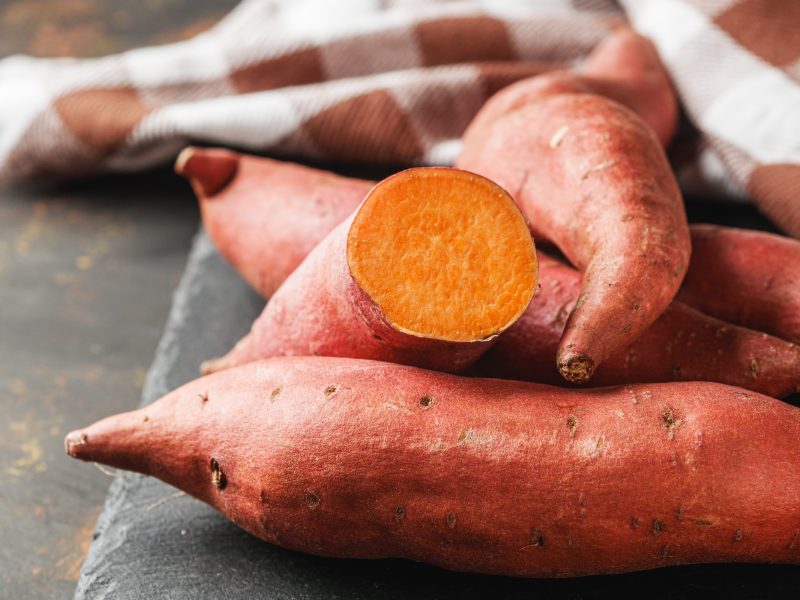Many have been taught that if we simply brush and floss twice a day, we can avoid cavities. However, no matter how well we maintain this habit, plaque and bacteria still find their way between our teeth, eventually causing decay or inflammation.
So even if we do our dental hygiene due diligence and still end up getting less than great news at the dentist’s office, what’s really going on and what else can we do?
What Causes Bad Oral Health?
There really isn’t a single cause of poor oral health. Of course, infrequent and improper brushing and flossing habits or techniques can lead to plaque buildup and inflammation.
Additionally, there are various sugary, acidic foods that can eat away at enamel, even if you brush your teeth two to three times a day. Foods like coleslaw, salad dressing, dried fruit, citrus fruits, eggs, red meat, tomatoes, and pickled produce can all contribute to tooth decay. [1]
Foods That Are Good for Oral Health
So, what foods can you eat that will also improve or sustain your oral health?
There are quite a few Paleo options to add to your diet that help support clean teeth and gums, such as green or black tea, foods with fluoride, and fiber-rich fruits and vegetables, like watermelon. [2]
Why Is Watermelon Good for Your Oral Health?
While there are many fruits and vegetables that support oral health, watermelon provides multiple benefits to your mouth, making it an oral health superfood.
Increases Saliva Production
Dr. Jerry Friedman, a dentist from North Jersey, explains that watermelon helps promote saliva production in the mouth, which is critical for fighting off periodontal diseases. Periodontal disease, more commonly known as gum disease, occurs when plaque builds on the teeth and hardens, causing your gums to become irritated, swollen, and, in severe cases, bleed. [3]
While proper brushing and flossing can help prevent this, saliva production can also fight off the bad bacteria before it hardens on the teeth. A watermelon a day might just keep gum diseases away.
Rich in Fiber
Above, it’s mentioned that fiber-rich fruits and vegetables help support clean teeth. Watermelon, like all melons, is loaded with fiber. Dr. Friedman informs us that “fiber helps clean plaque off of our teeth.” Essentially, fiber works similarly to how a toothbrush works, it helps dissolve the gunk on your teeth with every bite. [4]
This does not mean that eating watermelon can fight off a deep cavity that has been developing for a while. However, the fiber in watermelon can help fight the early stages of tooth decay by reducing buildup on your teeth.
Antibacterial Properties
Plaque buildup and bacteria from leftover food can get stuck on our teeth and begin to eat away at the enamel. This is how cavities form, and the more the enamel is eaten away, the deeper the cavity becomes. If the cavity reaches deep enough, you could even be at risk of needing a root canal.
But there’s no need to fear! A 2023 study shows that watermelon contains naturally occurring bioactive chemicals with antibacterial properties that can help fight against tooth decay. This helps prevent unwanted buildup and cavities from forming, so the next time you go to the dentist, they just might have no bad news.
Rich in Malic Acid
If you drink coffee, wine, or juice, you might struggle with or be at risk of teeth stains. While discoloration or teeth stains that are non-plaque related are not typically a health risk, yellow teeth are unwanted and unappealing to most people.
Dr. Friedman explains that along with its ability to clean our teeth, watermelon contains malic acid, which can also remove stains on your teeth. Malic acid “is a carboxylic acid group that can whiten teeth by oxidizing the surface of tooth enamel.” [6]
Overall, a healthy lifestyle and diet will help improve your oral hygiene. Avoid processed foods when possible, especially those with high levels of sugar. Adding foods like watermelon to your diet is a great way to support healthy gums and teeth without using any harsh chemicals or consuming potentially harmful additives.
Below are some fun recipes that you can make containing watermelon and other mild ingredients for your dental health:
References
- Mantazis D. 23 Lesser-Known Foods That Cause Tooth Decay [Internet]. Hove Dental Clinic. 2022. Available from: https://www.hovedentalclinic.co.uk/blog/foods-that-cause-tooth-decay/
- University of Rochester Medical Center. The Best and Worst Foods for Your Teeth – Health Encyclopedia – University of Rochester Medical Center [Internet]. Rochester.edu. 2019. Available from: https://www.urmc.rochester.edu/encyclopedia/content.aspx?ContentTypeID=1&ContentID=4062
- NIH. Periodontal (Gum) Disease [Internet]. www.nidcr.nih.gov. 2018. Available from: https://www.nidcr.nih.gov/health-info/gum-disease
- dentist Menasha WI – How Eating Foods Rich in Fiber and Help Your Oral Health | Mid Valley Dental, SC [Internet]. midvalleydental.com. [cited 2024 Aug 2]. Available from: https://midvalleydental.com/p/BLOG-86315-2021.8.9-How-Eating-Foods-Rich-in-Fiber-and-Help-Your-Oral-Health-p.asp?C=1288
- Rajagopal S, Sugumaran S, Rajagopal S, Sugumaran S. The Antibacterial Effectiveness of Citrullus lanatus-Mediated Stannous Nanoparticles on Streptococcus mutans. Cureus [Internet]. 2023 Sep 18 [cited 2024 Apr 15];15(9). Available from: https://www.cureus.com/articles/174900-the-antibacterial-effectiveness-of-citrullus-lanatus-mediated-stannous-nanoparticles-on-streptococcus-mutans#
- Pujari V. Journal of Advanced Medical and Dental Sciences Research. Journal of Advanced Medical and Dental Sciences Research. 2019 Sep;7(9).


